Properties of Aluminum:
- Physical Properties: Aluminum is a soft, lightweight metal with a density about one-third that of steel. It has a silvery-white appearance and is non-magnetic.
- Chemical Properties: Aluminum is a highly reactive metal and readily forms a thin oxide layer on its surface, which provides its corrosion resistance.
- Mechanical Properties: Aluminum is malleable, ductile, and easily machined, making it a versatile material for various applications.
Uses of Aluminum:
- Construction: Aluminum is widely used in the construction industry for making doors, windows, roofing, and structural components due to its light weight and corrosion resistance.
- Transportation: Aluminum is used in the manufacturing of aircraft, automobiles, and marine vessels for its high strength-to-weight ratio, which helps in fuel efficiency and performance.
- Packaging: Aluminum foil is used for packaging food and beverages due to its impermeability to light, gases, and moisture, as well as its ability to maintain the freshness of the contents.
- Electrical Conductors: Aluminum is used as a conductor in electrical transmission lines and conductive wires due to its high electrical conductivity and low cost.
- Consumer Goods: Aluminum is used in the production of everyday items such as cookware, utensils, and electronic devices due to its durability and aesthetic appeal.
Significance of Aluminum:
- Economic Impact: The production and use of aluminum contribute significantly to the global economy, with a wide range of industries relying on this versatile metal.
- Sustainability: Aluminum is a highly recyclable material, and its recycling process requires significantly less energy compared to primary production, making it an environmentally sustainable choice.
- Technological Advancements: The development of aluminum alloys and composites has led to innovations in aerospace, automotive, and other industries, pushing the boundaries of materials engineering.
[Aluminum] Related Worksheets and Study Guides:
.◂Science Worksheets and Study Guides Sixth Grade. Mollusks, Arthropods and Echinoderms
Study Guide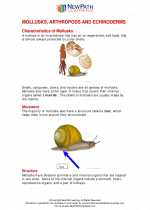 Mollusks, Arthropods and Echinoderms
Mollusks, Arthropods and Echinoderms  Activity Lesson
Activity Lesson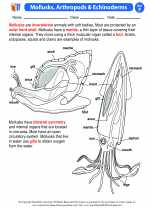 Mollusks, Arthropods & Echinoderms
Mollusks, Arthropods & Echinoderms  Worksheet/Answer key
Worksheet/Answer key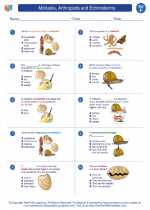 Mollusks, Arthropods and Echinoderms
Mollusks, Arthropods and Echinoderms  Worksheet/Answer key
Worksheet/Answer key Mollusks, Arthropods and Echinoderms
Mollusks, Arthropods and Echinoderms  Worksheet/Answer key
Worksheet/Answer key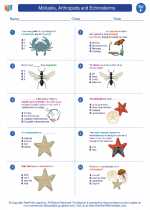 Mollusks, Arthropods and Echinoderms
Mollusks, Arthropods and Echinoderms  Worksheet/Answer key
Worksheet/Answer key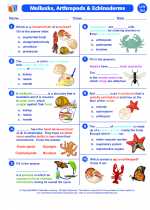 Mollusks, Arthropods and Echinoderms
Mollusks, Arthropods and Echinoderms  Vocabulary/Answer key
Vocabulary/Answer key Mollusks, Arthropods and Echinoderms
Mollusks, Arthropods and Echinoderms  Vocabulary/Answer key
Vocabulary/Answer key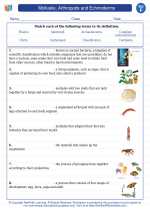 Mollusks, Arthropods and Echinoderms
Mollusks, Arthropods and Echinoderms  Vocabulary/Answer key
Vocabulary/Answer key Mollusks, Arthropods and Echinoderms
Mollusks, Arthropods and Echinoderms  Vocabulary/Answer key
Vocabulary/Answer key Mollusks, Arthropods and Echinoderms
Mollusks, Arthropods and Echinoderms  Vocabulary/Answer key
Vocabulary/Answer key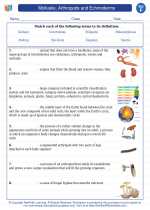 Mollusks, Arthropods and Echinoderms
Mollusks, Arthropods and Echinoderms  Vocabulary/Answer key
Vocabulary/Answer key Mollusks, Arthropods and Echinoderms
Mollusks, Arthropods and Echinoderms  Vocabulary/Answer key
Vocabulary/Answer key Mollusks, Arthropods and Echinoderms
Mollusks, Arthropods and Echinoderms 

 Activity Lesson
Activity Lesson
 Worksheet/Answer key
Worksheet/Answer key
 Worksheet/Answer key
Worksheet/Answer key
 Worksheet/Answer key
Worksheet/Answer key
 Worksheet/Answer key
Worksheet/Answer key
 Vocabulary/Answer key
Vocabulary/Answer key
 Vocabulary/Answer key
Vocabulary/Answer key
 Vocabulary/Answer key
Vocabulary/Answer key
 Vocabulary/Answer key
Vocabulary/Answer key
 Vocabulary/Answer key
Vocabulary/Answer key
 Vocabulary/Answer key
Vocabulary/Answer key
 Vocabulary/Answer key
Vocabulary/Answer key

The resources above cover the following skills:
LIFE SCIENCE
From Molecules to Organisms: Structures and Processes